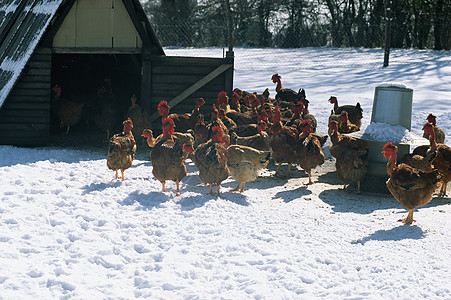Winter puts some special demands on the breeding of laying hens. In order to maintain the production performance and health status of laying hens under cold weather conditions, the following are some key points and considerations for winter egg farming.
Provide suitable temperature: With lower temperatures in winter, laying hens need to maintain a suitable temperature to maintain normal physiological functions and egg production capacity. Set up suitable heating equipment, such as electric heaters or heat lamps, to keep the internal temperature of the chicken coop stable at 15-20 degrees Celsius. At the same time, ensure good ventilation inside the chicken coop to prevent excessive air humidity.
Feed and water supply: Laying hens’ appetite may be weakened by the cold weather in winter. However, adequate feed and water still need to be provided. Add an appropriate amount of vitamins and minerals to the feed to enhance the immunity and resistance of the laying hens. At the same time, ensure that the feed and water supply is not frozen, either by heating or insulation.
Maintain a good hygienic environment: Higher humidity in winter makes chicken coops prone to harboring germs and parasites. Regularly clean the coop to keep it dry and clean, and change the bedding in the coop in a timely manner. At the same time, pay attention to disinfection and use appropriate disinfectants to disinfect the chicken coop to prevent the spread of diseases.
Control breeding density: The range of movement of laying hens may be limited in winter, so it is necessary to appropriately control the breeding density in the chicken coop to avoid overcrowding. Overcrowding will increase fighting and stress among chickens, affecting egg production and health.
Strengthen flock management: The resistance of laying hens is weak in winter and they are easily attacked by diseases. Strengthen flock management, regularly observe the health condition of chickens, and take timely measures if abnormalities are found. Pay attention to the hygiene and dryness of the rearing environment, and regularly clean up the chicken manure in the chicken coop to prevent the spread of diseases.
Provide suitable light: The light time is shorter in winter, which has a certain impact on the egg production rate of laying hens. Lighting time can be extended by artificial lighting to maintain 12-14 hours of light per day. Reasonable light time can stimulate the egg-laying hormone secretion of laying hens and improve the egg-laying rate.
Cold protection and warmth measures: Take some cold protection and warmth measures, such as thickening the heat preservation material for the chicken coop, closing the air leakage vent, and keeping the inside of the chicken coop warm. At the same time, provide enough shelter for laying hens from the wind and cold, such as windbreaks and sunshade nets, etc., to protect laying hens from the cold and wind chill.
By following the above points and precautions, you will be able to successfully raise healthy, high-yielding laying hens. Raising chickens in winter requires special attention to temperature, feed and water supply, maintenance of hygienic environment, control of breeding density, enhancement of flock management, regulation of light hours, and measures to prevent cold and keep warm.
Post time: Dec-15-2023





